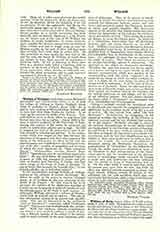

William of Moerbeke, scholar, Orientalist, philosopher, and one of the most distinguished men of letters of the thirteenth century, b. about 1215; d. in 1286. He held intellectual intercourse with the philosopher Thomas Aquinas, the mathematician John Campanus, the naturalist physician Witelo, and the astronomer Henri Bate of Mechlin. In turn he resided at the pontifical court of Viterbo (1268), appeared at the Council of Lyons (1274), and from 1277 until his death occupied the See of Corinth. At the request of Thomas Aquinas he undertook a complete translation of the works of Aristotle or, for some portions, a revision of existing translations, and it is noteworthy that he was the first translator of the “Politics” (c. 1260). The ancient catalogue of Dominican works published by Denifle (Arch. f. Litteratur u. Kirchengesch. d. Mittelalters, II, 226) states: that “he translated all the books of natural and moral philosophy from Greek into Latin, as did Brother Thomas, like-wise the books of Proclus and certain others.” Henry of Hervodia asserts that these translations were classic in the fourteenth century; they are literal (de verbo ad verbum) and faithful, and although without elegance are valuable. Petrus Victorius a sixteenth-century philologist, praises them highly, and Susemihl, who has published a critical edition of the Greek text of the “Politics”, sought to do service even to philologists by adding the translation of William of Moerbeke. The Flemish Dominican translated not only Aristotle but also mathematical treatises (notably the “Catoptrics” of Hero of Alexandria and the treatises of Archimedes), commentaries of Simplicius on the Categories of Aristotle and on the “De coelo”, and especially the “Theological Elements” of Proclus (the translation is dated Viterbo, May 18, 1268). Several other of Proclus’s works no longer exist save in the Latin versions of William of Moerbeke, which makes the latter more valuable. The same may be said of a treatise of Ptolemy’s, likewise translated by the Belgian Dominican, the Greek text of which exists only in fragments. The “Theological Elements” of Proclus together with the “Book of Causes”, which compiles them, constitute the fundamental source of the Neo-Platonic inspirations of the thirteenth century, so that William exercised a real influence on the Neo-Platonic movement, which appeared sporadically in the philosophy of the thirteenth century. The Polish physician Witelo, whose curious personality has been made known by M. Baeumker, wrote his “Perspectives” at the instance of Brother William of Moerbeke, the lover of truth (veritatis amatori), to whom he dedicated the treatise. Witelo was one of the authorized representatives of Neo-Platonism. It was likewise to William that Henri Bate dedicated his “Astrolabe”. William of Moerbeke thus appears as a mind of high culture and extensive relations, a forerunner of humanism, who studied all his life and encouraged others in the path of knowledge.
M.DE WULF

